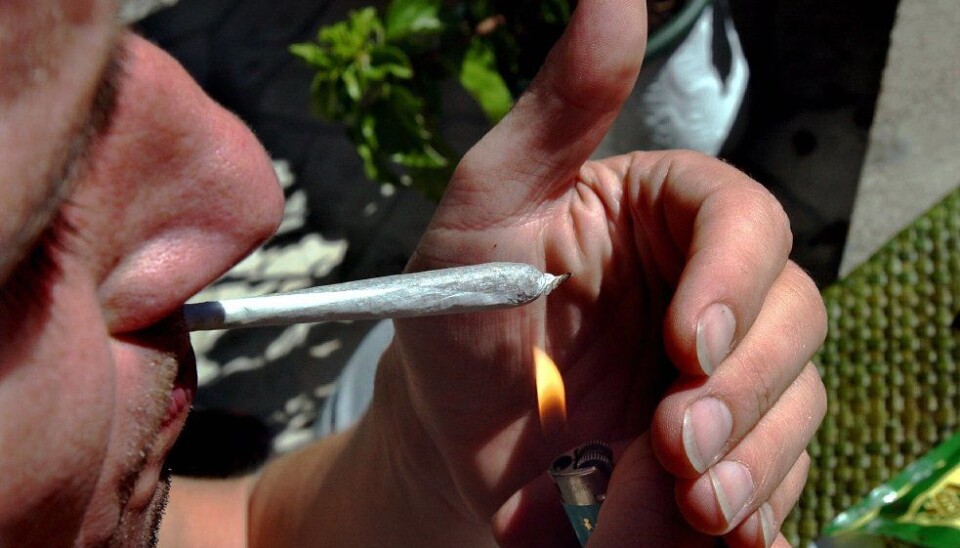
Does pot really make you dumber?
A Norwegian economist thinks cannabis doesn’t necessarily make you less intelligent. He says earlier research on declining IQ among users has neglected to account for social backgrounds. But other researchers blame the drugs.
Denne artikkelen er over ti år gammel og kan inneholde utdatert informasjon.
Four decades of research on a group of New Zealanders have shown a causal relationship between cannabis use and declining IQs.
This provoked Ole Røgeberg, an economist at the University of Oslo’s Frisch Centre.
His new analysis, now being published in PNAS ‒ the same journal that published the first study ‒ concludes that the researchers failed to account sufficiently for the social backgrounds of the people that were studied.
“Their methods haven’t been capable of discerning between a causal effect of cannabis on IQs and an effect induced by other causes,” he says.

But the researchers behind the study of the Kiwis who smoke pot aren’t convinced, so the debate continues.
Environment for cannabis use
Terrie Moffitt and colleagues at Duke University in the USA looked at how cannabis use from an early age affected the IQs of pot smokers. The data material from Dunedin in New Zealand is unique in terms of its timeline – 38 years. The researchers found a small, but statistically significant effect:
Cannabis smokers had on average a six-point lower IQ.
The problem with that, according to Ole Røgeberg, is that they didn’t control sufficiently enough for alternative explanations that have an impact on both IQs and the probability of becoming a pot smoker:
“Some newer research shows that IQ is a bit like physical strength: If you are in an environment where you are constantly challenged to think abstractly and theoretically, then your IQ grows higher,” he explains.
“People who for one reason or another are turning away from intellectually challenging arenas don’t work as hard at school. They get less education, are less apt to discuss ideas, have poorer and less demanding jobs – and this means you can expect their IQs to drop relative to others’. They are in the same group of people who have a tendency to start smoking cannabis as teenagers.”
In other words, socioeconomic factors are entering the equasion.
Your class and social background will on average have an effect on whether you are very smart - measured in IQ scoring abilities, and whether you are more likely to start using hashish and marijuana, without the drug necessarily having an effect on your IQ.
Hard to duplicate
“This data material from New Zealand is so unique that it is hard to duplicate the results with other sets of data. This makes it all the more important to discuss their methods. Is it this factor or that which explains the results, or is it a mix?” queries Røgeberg.
“In previous publications based on the data from Dunedin IQ measurements from the ages of seven and nine were included. They could have included these assessments too, not just from the age of 13 and the age of 38,” says the economist.
“Did the persons who ended up as cannabis users have the same IQ developments before the age of 13, or were they already showing another trend? This could be relatively easily checked out by researchers.”
Sufficient controls
Moffitt and two other authors of the initial study write that Røgeberg’s ideas are intriguing, but they aren’t supported by the data.
“We have controlled for socioeconomic factors by limiting our analysis to individuals from the middle class, with a main breadwinner who works for instance as a building inspector or a plumber,” they write.
They add that they’ve excluded families where for instance a factory worker or a dentist is the breadwinner.
“When we limit our analyses to just middle class families the IQ declines among those who start smoking cannabis in their teens stands up. This indicates it isn’t due to socioeconomic issues alone,” they write.
More details needed
Røgeberg is glad to have triggered a debate. In a reply to the answer from Moffitt and his colleagues he clarifies his objections.
He would be satisfied if the Americans can supply a better basis for their claims.
“But we would then need to see the details of the study and it has to be conducted in an orderly and sufficiently comprehensive way, not as they have done in their response to date.”
Røgeberg stresses that he would be pleased to cooperate with the Americans to try and find out which factors are really at play, and gauge their impacts.
A point of policy
The issue of cause and effect might seem simply academic. Whether cannabis is lowering your IQ or your IQ is on the wane and you smoke marijuana – the result is still a lower IQ.
However, Røgeberg thinks the nuance is essential for our policy makers:
“It might be that you smoke pot for a period and do less well at school, and then you quit smoking. But by then you’ve already fallen on the IQ scale because the smoking led you to things that really do have an effect on your IQ,” he says.
“The difference is that the effects that are linked to environment rather than the drug would not be permanent.”
If those who use cannabis in their teens encounter problems because they are marginalised, it means that the strong penalties for drug use are only making things worse, reinforcing this marginalisation.
“But if the opposite is the case, and there’s a direct medical link, then it might be better to have stringent legislation to curb this influence as much as possible. The issue of how we relate to ways young people use toxicants is important and we need to know what the deleterious effects are,” says Røgeberg.
-------------------------------
Read the Norwegian version of this article at forskning.no
Translated by: Glenn Ostling
Scientific links
- O. Røgeberg, Correlations between cannabis use and IQ change in the Dunedin cohort are consistent with confounding from socioeconomic status. PNAS, published online at January 14, 2013 (abstract)
- M.H. Meier et al, Persistent cannabis users show neuropsychological decline from childhood to midlife. PNAS, published online August 28, 2012


































